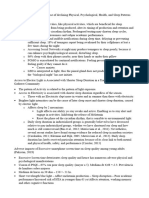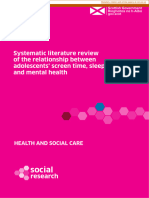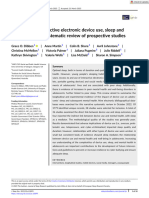Primary version of question:
"How does screen time before bed affect sleep quality in teenagers?"
Research Topic:
"The effect of screen time before bed on sleep quality in teenagers."
Research Topic(quantitative):
"How screen time before bed affects the amount and quality of sleep in teenagers."
Introduction
In today’s digital age, screens are an integral part of our lives, especially for
teenagers. Whether it’s scrolling through social media, watching videos, or playing
video games, many teens spend considerable time in front of screens, particularly
before bedtime. This habit raises concerns about its potential impact on sleep.
Sleep is crucial for teenagers, as it affects their mood, academic performance, and
overall well-being. This study aims to explore how screen time before bed affects
both the duration and quality of sleep in adolescents.
Climax
To investigate this, we surveyed a group of teenagers, asking about their nightly
screen time and sleep patterns. We found that those who spent more than two hours
on screens before bed reported significantly less sleep duration and poorer sleep
quality compared to their peers who limited their screen time. Many teens
described difficulty falling asleep, frequent awakenings, and feeling tired during
the day. Research indicates that approximately 70% of teens experience sleep
issues related to screen use. The blue light emitted from screens was frequently
mentioned as a factor that interferes with their natural sleep cycles. As we
analyzed the results, it became clear that excessive screen time is not just a habit;
it’s a barrier to restful sleep for many young people.
Resolution
In conclusion, our findings suggest a strong relationship between screen time
before bed and negative sleep outcomes in teenagers. Reducing screen time in the
evening could lead to longer and more restful sleep, improving not just their mood
and energy levels but also their overall quality of life. Encouraging teens to
establish a digital curfew, such as turning off screens an hour before bedtime, may
help mitigate these issues. As we navigate this digital landscape, it's essential to
recognize the importance of healthy sleep habits, paving the way for happier and
healthier lives for our youth.
By Natevan & Ziya






























































